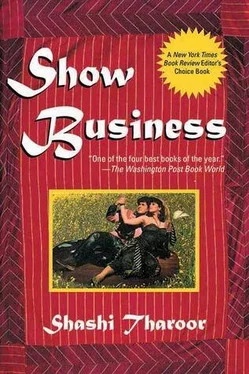Anyway, that was the nature of my love life during my first few years in films. Whores at Kamathipura, slatterns from the studios, Sunita. Can’t say there’s much progression there. Till Maya came along.
You barely noticed Maya, of course. You were too full of yourself for that, Ashok. Full of what you thought of as the success of your first film, full of your new hero role in Godambo, full of the attentions of the college girls and new generation lady-journalists who had just begun to flock around you in those days. Girls who wore jeans and T-shirts, and cut their hair shoulder-length, and spoke English; girls you could take to the disco and give smarmy interviews to for the new glossy magazines that were outchattering Cheetah. Maya was small, and simple, even somewhat plain. Her hair was so long she could have sat on it. She wore it in plaits; and she favored salwar-kameez that clearly hadn’t been tailored in a metropolis. She was decidedly unglamorous. She spoke English, but it was a language she’d learned, and she didn’t sparkle with the slang and facile abbreviations of Bombay or Delhi. She was the sisterly type, wasn’t she, the good little girl next door. You took one look, and you ignored her.
I didn’t ignore her. I went up to her on the set. I talked to her. I asked her about her family. Her father was a minor government servant, a railway official I think, then posted in some mofussil town, Bhopal or Bhagalpur or Bhatinda, one of those Bhs. She had no one in Bombay. She didn’t seem the Sunita-style fortune-seeking type, so I wondered what had brought her to moviedom. Incredible: she was a serious stage actress, she had done a Tendulkar play or something in this Bh town, and this guy in the audience came backstage and told her she had to be in the movies. Of course she didn’t take him seriously — who does he think she is? Lana Turner? — but no, he was on the level, he came to see her parents, explained he was something of a talent scout, even named two or three actors he’d discovered this way. And he turned out to be Jagannath Choubey’s brother.
Didn’t think it happened like that, did you? Well, at least you didn’t imagine it then, right? Now, of course, you know the whole story. I suppose.
Actually it wasn’t that uncommon. Not everybody in movies was born into it, like me and all the Kapoors, or lucked into it, like you. Rajesh Khanna actually won a talent contest. First prize was a screen test. He passed with flying colors.
Maya was so seedhi-saadhi, so innocent of any guile. She was the kind of girl any lower-middle-class Indian boy like myself meets all the time, unless he happens to be lower-middle-class in the film world, in which case he only gets to meet starlets and sluts (if that isn’t tautological). The moment I met her I realized I’d been waiting and wanting to meet her. Call it love at first sight. No, Ashok, I guess you won’t want to call it that. Call it anything.
She was sweet. She was trusting. She didn’t respond to me the way other Bombay actresses would, evaluating my unimportance, categorizing me by my role, my accent, my paan -stained mouth. She saw someone older, wiser, someone who knew the ropes, who told her where things were, how things should be done, what — and more important, who — should be avoided. For the first time in my life, Ashok, I began to feel I was more than the secondary villain.
And increasingly I became aware that the girl depended on me.
OK, so she had no one else. Except for some distant relatives charged by her parents with keeping an eye on her and whose reaction to the film world was either to gawk or to disapprove. Not much good that could do her. I was far more useful.
Don’t look so triumphant! It was also more than that. Inevitably, our contact extended beyond the studio. We started going out together. I gave her lifts home, to the little flat in Bandra where she’d found paying-guest accommodation. The landlady had a strict no-male-visitors rule, not even for relatives, and you can imagine what she would have thought of me. So I dropped her off, and sometimes, when she had the energy and I had the time, I took her out. Once or twice to the Prithvi Cafe, in fact, just to show her what that was like. I wasn’t yet in the five-star-hotel league in those days, though I did give her lunch at the Sun ’n’ Sand once, where she stared at the pool-side bikinis in shocked disbelief. But most of the time it was walks at the beach, pau-bhaji from a roadside vendor, bhel-puri out of folded leaves while we strolled at the edge of the sand and let the seawater trickle through our toes. Neither of us was famous enough to be recognized, let alone mobbed: we were just another of the lower-middle-class couples thronging Chowpatty, getting sand into our sandals and stars into our eyes. I bought her a paan once, and because she was so hesitant, I put it into her mouth. She blushed and turned away in such confusion that she made me feel I’d propositioned her.
I hadn’t really thought of her that way, you know. There are some women you look at physically, judge them primarily by what you think they’d look like under all those yards of cloth that Indian tradition and Indian tailors conspire to ensure they’re swathed in. Then there are women you can’t possibly think of that way — older relatives, for instance, or some of the asexual buffalo with hairy moles on their chins you run into at Crawford Market, browbeating the butcher. But somewhere in between there are women whom you relate to quite differently, women who are pleasant and attractive, maybe even beautiful, but whose physicality is not the first thing that strikes you about them, perhaps not even the second thing. These are women with a certain other quality, a grace, a gentleness, an inner radiance that surrounds them when they smile, or speak, or move; women you can love, or worship, or hope to marry. I bet you think that’s naive provincial nonsense, don’t you, Ashok? You urban sophisticates know that ultimately all women are reducible to what you want out of them. And it’s always the same thing.
I didn’t buy Maya another paan, but I saw a lot more of her afterward, and I began to think of her — well, differently. A day without her seemed to go on forever; I needed her laughter to shorten the hours. I stopped living with Sunita. I shaved more often for Maya; the trademark stubble on my face became a calendar of her absences. I began reading then, reading seriously, acquiring the vocabulary I’m using today and the ideas I haven’t yet had a chance to use. I didn’t stop chewing paan, but I saw Maya didn’t like me spitting it out in public, so I found more discreet ways to get rid of the red stuff. She changed me, Ashok Banjara. Or perhaps it is truer to say I changed myself for her.
And how did she react to me? What did she feel about me? I bet you’d like to know. Did you ask her, Ashok, or did you dismiss the subject as being of no consequence? She must have told you something about me, surely? After all, I was the only man in her life between her father and you. She must have wanted to speak about me.
But I suppose you didn’t want to hear any of it. Pranay the interlude, an episode best forgotten. Pretend it never happened.
No, I’m sure there is something you wanted to know. I imagined you in those days seething with resentful curiosity about it. How far had we gone? You must have found it difficult to convince yourself that this small-time villain with the red-stained mouth contented himself with walks on the beach. Maya was no schoolgirl, after all, even though she was cast as one. She turned twenty during the shooting of Godambo, didn’t she? I heard the technicians refer to her once as the Virgin Maya, and I couldn’t even blow them up for their irreverence from fear of insulting her by implication. So the Virgin Maya she remained. But after her association with me, you must have wondered, was she still really a virgin? Or was she all maya, mere illusion?
Читать дальше












